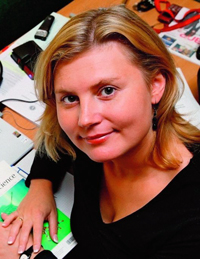
Dr hab. Katarzyna Zawalińska

In years 2010-2013 assistant professor at the Centre for European Regional and Local Studies (EUROREG), University of Warsaw. Currently cooperating with EUROREG in the framework of project: "Regional input-output tables as a research tool for analyses of smart growth". Research Director at the Institute of Rural and Agricultural Development, Polish Academy of Sciences (IRWiR PAN). She holds her habilitation and PhD degree in economics from University of Warsaw. She holds her MPhil in development degree from Cambridge University (Corpus Christi College). She competed her post doc at the University of Helsinki and paid several study visits: at Monash University (Australia), Glasgow University (Scotland), Sacred Hard University (USA). Her main interest is regional computable general equilibrium modelling (regional CGE), evaluation of regional and rural policies, agricultural policy, economics of development and research or productivity changes. She has several publications on her account, including papers in such journals as Applied Economics, Comparative Economic Studies, Agricultural Economics. She was involved and leading many research and evaluation project, both national and international (ESPON, World Bank, European Commission). Between 2009/2010 she was a member of Advisory Board on Rural and Agricultural Development at Polish President, and between 2010-2012 a Member of European Science Foundation (Social Sciences Committee).
- Celińska‐Janowicz Dorota, Zawalińska Katarzyna, Widła‐Domaradzki Łukasz (2013) Structural Equation Model of Successful Territorial Cooperation [in:] Gorzelak Grzegorz, Zawalińska Katarzyna (eds.): European Territories: From Cooperation to Integration? Warszawa: Wydawnictwo Naukowe Scholar, pp. 134‐154.

- Zawalińska Katarzyna (2012) Rozwój obszarów wiejskich w warunkach zmieniającej sie koniunktury gospodarczej. Roczniki Naukowe Stowarzyszenia Ekonomistów Rolnictwa i Agrobiznesu, nr 24(1).
- Zawalińska Katarzyna (2010) Modelowanie rozwoju ekonomicznego na przykładzie polityki rozwoju obszarów wiejskich i regionalnego modelu równowagi ogólnej RegPOL. Roczniki Nauk Rolniczych, Seria G, t. 97, z.2, ss. 62-75.
- Zawalińska Katarzyna (2010) Regionalne zróżnicowanie absorpcji wsparcia unijnego dla polskiej wsi i skutki dla rozwoju społeczno-gospodarczy kraju [w:] Stanny Monika, Drygas Mirosław (red.): Przestrzenne, społeczno-ekonomiczne zróżnicowanie obszarów wiejskich w Polsce. Problemy i perspektywy rozwoju, Warszawa: IRWiR PAN.
- Zawalińska Katarzyna (2010) Rola polityki rolnej w rozwoju obszarów wiejskich na przykładzie Polski [w:] Wybrane problemy z zakresu polityki rolnej, Warszawa: Ministerstwo Rolnictwa i Rozwoju Wsi.
- Zawalińska Katarzyna (2010) The role of Agricultural Policy in Rural Development: Example of Poland [in:] Selected considerations of the Agricultural Policy, Warsaw: Ministry of Agriculture and Rural Development.
- Zawalińska Katarzyna (2010) Wielofunkcyjność rolnictwa w ujęciu modelowym [w:] Wilkin Jerzy (red.): Wielofunkcyjność rolnictwa. Kierunki badań, podstawy metodologiczne i implikacje praktyczne, Warszawa: IRWiR PAN.
- Zawalińska Katarzyna (2010) Wnioski i rekomendacje wynikające z badań pracowników IRWiR w 2009 roku. Wieś i Rolnictwo, 1/2010 (146).
- Zawalińska Katarzyna, Giesecke James, Horridge Mark (2010) The Regional Economic Consequences of Less Favoured Area Support: A Spatial General Equilibrium Analysis of the Polish LFA Program [in:] General Paper No. G-211, Centre of Policy Studies and the Impact Projects, Melbourne: Monash University, pp. 33.
- Regional input-output tables as a research tool for analyses of smart growth (2013-2016)
- GRINCOH: Growth – Innovation – Competitiveness: Fostering Cohesion in Central and Eastern Europe (2012-2015)
- ESPON TERCO: European Territorial Cooperation as a Factor of Growth, Jobs and Quality of Life (2010-2013)



